Obama’s Populism At Odds With His Path To Re-Election
The partisan crowds like President Obama's populist rhetoric but it seems ill-suited for his re-election strategy.
While many on the left are cheering President Obama’s new found populism and his attacks on “the rich,” National Journal’s John Kraushaar argues that this rhetoric is placing the President’s re-election strategy in jeopardy:
President Obama’s reelection is in trouble because of the nation’s troubled economy, but he’s been exacerbating his problems by running a populist campaign at odds with the electoral strategy his advisers have laid out. Not only is his new rhetoric chastising the wealthy to pay their fair share at odds with the president’s well-crafted image of being a post-partisan uniter, but it risks alienating the white-collar professionals that have become an increasingly important part of a winning Democratic coalition.
The president’s team has been arguing that their path to reelection lies in winning battleground states like Colorado, Virginia, and North Carolina—diverse, more affluent white-collar states with growing numbers of independents. But the president’s emphasis on pitting the affluent against the middle-class threatens to push away the very independents he’s seeking to win back. It’s the type of populist message that’s better geared toward blue-collar voters in the Rust Belt, which the campaign sees as close to a lost cause.
(…)
Poring through the polling data, the answer isn’t encouraging for Team Obama. If the president’s path to reelection lies in the college-educated white electorate, he has a long way to go to win them back. Even after his jobs speech and campaign-style promotion, his numbers have been sagging.
Take Virginia, the linchpin to the president’s reelection strategy. In a poll conducted last month, Quinnipiac found the president with a dismal 40 percent job-approval rating in the Old Dominion—lower than his approval ratings in the Rust Belt battlegrounds of Ohio and Pennsylvania.
Among independents, his job approval dropped to 29 percent—a remarkable fall from the 49 percent of the independent vote he won in Virginia. In prosperous Northern Virginia, where he won overwhelmingly with 64 percent in 2008, the poll found his approval had fallen to 40 percent.
Democratic pollster Stanley Greenberg found similar results last month surveying 60 of the leading Republican-held battleground House districts—many of which are in the affluent suburbs where Obama needs to do well. In these battlegrounds, Obama’s job approval is at 41 percent, and he trailed both former Massachusetts Gov. Mitt Romney and Texas Gov. Rick Perry. Only 32 percent of independents in these districts approved of Obama’s performance, with 60 percent disapproving. In 2008, Obama carried the districts with 52 percent of the vote.
Those independents are the voters that Obama needs to appeal to if he’s going to win re-election. Instead, he seems to be engaged in some version of the 2004 Bush re-election strategy of appealing to the base of his party on the theory that increasing base turnout will be enough to put him over the top. While that may work really well in traditionally blue states, it’s not necessarily the way to win in the “purple” states like Virginia and North Carolina:
Liberals have long argued that a message calling for the wealthy to pay their fair share is broadly popular—and indeed, most polls show voters support abstract proposals calling for higher taxes on the rich. But it’s rarely worked in practice. If taxes were raised as part of a comprehensive economic plan raising revenues and cutting spending, that’s one thing. As part of a political argument designed to mobilize the base for his reelection campaign, it’s bound to be received less warmly. The fact that moderate congressional Democrats have been keeping the proposal at arm’s length says more about the plan’s popularity than polls testing different arguments, without context.
In the end, the political law of gravity usually wins out. In its latest survey of political ideology, Gallup found 41 percent of the electorate defining itself as conservative, 36 percent as moderate, and just 21 percent as liberal. Obama’s tax-and-jobs plan has been embraced by the latter group, a sign of how the overall public will perceive it.
When Republicans run to the base, as George W. Bush did in 2004, they’re appealing to a healthy plurality of the country’s electorate. When Democrats do the same, they’re appealing to a much smaller faction.
You don’t need any better example of that than to compare the 1984 and 1988 campaigns of Walter Mondale and Michael Dukakis to the 1992 and 1996 campaigns of Bill Clinton and the 2008 Obama Campaign. In the first two examples, the candidate made an appeal to his party’s left and ended up facing electoral disaster. In the other three examples, the candidates ran a campaign that appealed to the broad middle of the electorate and ended up winning significant support from Independents and, in Obama’s case, winning states that Democrats had not won since 1964. If President Obama is going to win again next year, he’s going to have to find a way to keep that 2008 coalition together, and that means getting back the independents who have, as the polls shown, turned against him:
Instead of going after these voters, though, President Obama seems intent on engaging in rhetoric that appeals mostly only to the Democratic base and pushing a jobs bill that even the Democrats in the Senate are reluctant to put their names on. It may make for good rallies, but I’m not sure it’s the way to win an election, especially this time around.
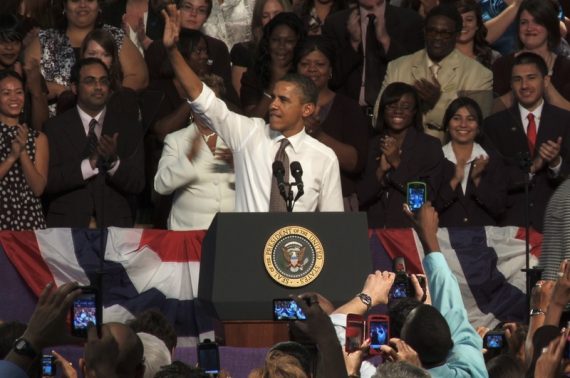
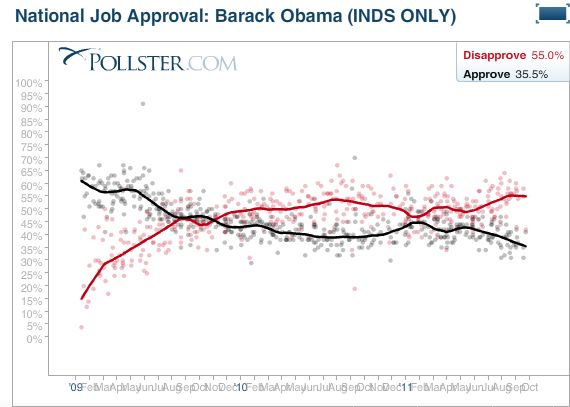

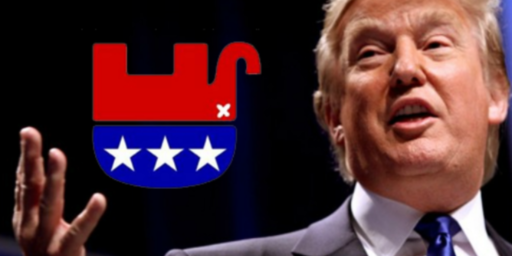
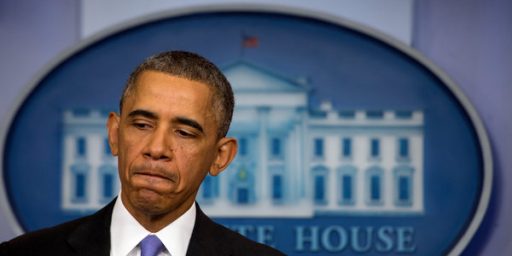

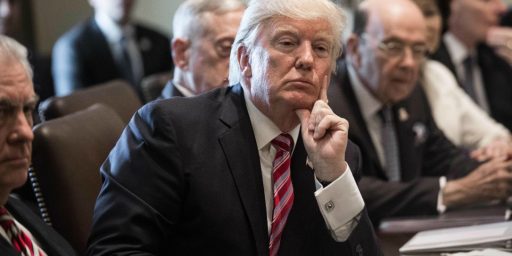
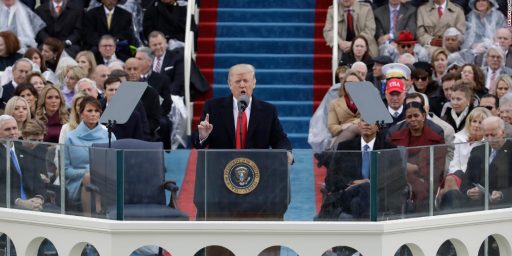
Gosh, this clearly is a dangerous strategy when barely 75% of the country thinks we should raise taxes on the rich and only a large majority of independents agree. If Obama is smart, he will only listen to Doug and the tiny minority who agree with him.
Seriously? Seriously?
You realize that Romney is a prime candidate for the Buffet rule right?
Explain to me how Romney counters this “populism” (I call returning to Clinton era rates smart economics – but tomato/tomato). Someone said Mitt pays somewhere around a 14% effective tax rate. Begalla says: “Millionaire Mitt thinks he should pay a lower tax rate than maids and Master Sergeants, and that’s what we’re calling the Romney Rule.”
Maybe you’re right. Maybe that’s not an effective contrast. You’re the political scientist.
A guy who ran a discount pizza chain is now the Republican frontrunner and…Obama is the one in trouble.
I believe the kids call this “concern trolling.”
The Natl J article seems to explain Obama’s strategy perfectly. Populism appeals to voters in rust belt states like Ohio and PA. The polling data reveals Obama is polling better in those states than he is in VA, Colorado and NC. As we’ve discussed previously, he doesn’t need very many of these states to win. Kerry states plus FL = victory.
Dovetailed with the “other 99%” budding social movement, part of the idea seems to be to expand the size of the base and alter the perceptions held by the “broad middle of the electorate.” That’s essentially what the tea party did for the Republicans in ’10 and I think it is way too early to say it will fail. Popular anger at Wall Street is not something that is going to appeal to Republicans, but it will appeal to plenty of independents.
This point is the most dubious in the entire article: “When Republicans run to the base, as George W. Bush did in 2004, they’re appealing to a healthy plurality of the country’s electorate. When Democrats do the same, they’re appealing to a much smaller faction.”
We’ll find out. The plan to increase taxes on the very rich is popular and I think a government jobs bill could be popular too. I saw a NC poll from last week showing that voters were about evenly divided about whether their representatives should vote for the jobs bill (about 35-35). However, one-quarter were undecided. That’s a lot of potential voters.
By the way, the one thing this brilliant bit of NJ analysis can’t seem to mention is that the strategy designed by Obama’s advisers was a disaster. They — and for all I know, he — wanted him to run as the only sane guy, the one who was always available to compromise and make a deal. Turned out people didn’t want a president who could be rolled by a bunch of thugs who made demands and then refused to accept them when Obama gave in to them.
The strategy was a sucker’s game, and I’m glad Obama smartened up and dumped it.
What none of you understand is that “raising taxes on the rich” isn’t going to do anything to promote economic growth, which is what those independent voters are going to be most concerned about.
Steve Benen and through him Greg Sargent do a good job of refuting the National Journal’s concern trolling.
@ Doug…
The so-called republicans have set the terms of the fight: Are we going to abolish Medicare in order to cut the historically low taxes the wealthy pay even more, or are we going to take a reasonable approach and raise some taxes and tinker with the entitlements without touching benefits.
Given an obstructionist congress there is nothing Obama can do about the economy now…it is going to do what it’s going to do between now and November ’12.
Obama has made his stand: short term stimulus and long term deficit/debt reduction. The so-called republicans have made theirs: Cut taxes for the rich and de-regulate the Koch Brothers.
Hey Norm,
I’ve watched all three of the last GOP debates. Nobody’s talking about abolishing Medicare.
@Doug Mataconis: Uh-huh. Did you glance at the Paul Ryan budget every R in congress voted for and every candidate has supported?
@Doug Mataconis: Well, slashing taxes on the rich hasn’t done anything to spur economic growth, and since you keep saying we’re in a desperate budget hole, we’ve got to get the money from somewhere.
From Frum: [say that five times]
As with all Romney statements there is a caveat…he will definitely change his mind later.
Jon Stewart did a great reminder of this last night.
Check it out and get back to me about Obama’s chances vs. Romney.
@Rodger: “Populism appeals to voters in rust belt states like Ohio and PA.”
Being from the rust belt, raising taxes during a recession will not be viewed popularly. Raising taxes on the rich (or related fair share arguments) may poll well in the abstract, but unless its in a part of the country that feels its recovered its jobs, raising taxes now will be alarming. That’s how Republicans picked up seats in 2010 in populist Democratic districts.
(This is a political comment, not policy; I think we need to start raising taxes through comprehensive reform of the tax code)
What does a libertarian ideologue know about what independent voters want on economic matters? Why should anyone take your “analysis” seriously?
@Doug Mataconis: I disagree. Aggregate demand is weak, suggesting that putting more money in the hands of the working poor and the middle class would boost consumer spending, and everything I’ve been reading lately tells me there’s no reason right now to provided incentives for investment, since corporations have loads of cash. If you know of analysis by an economist that tells a different story, I’d be interested in reading it.
A “tax the rich” is working beautifully in Mi and IL, where hardly a wekk goes by without an article on people and businesses fleeing……..
I’ve always said, when the economy is in the tank, eat the job creators.
Brilliant.
Seeing Drew’s comment @ 16:34 made me take another look at Doug’s comment @ 15:29.
Tax the rich is a huge oversimplification…which is to be expected from Drew/Jan/Eric/JTea [take your pick] I suppose. But Doug?
Obama is not just saying let’s tax the rich. He’s arguing for short term stimulus now and in the long term something like The Grand Bargain or Bowles/Simpson or the Group of Seven…all of which are in the same wheelhouse and all of which call for increased revenues. However it is, after all, a campaign…and the populism of raising taxes on the wealthiest amongst us has overwhelming bi-partisan support. Overwhelming.
@Doug Mataconis:
But to understand this rationale you have to have some kind of emotional intelligence, which many here don’t have.
@Drew: We know about “job creators” in Florida. Like their job creating governor. He pushed through a bill forcing all “welfare” recipients to get drug tests. Coincidentally, his wife is now the primary owner of the biggest drug testing chain in the state. They didn’t actually find anyone using drugs, but man they made jobs for a bunch of low-wage techs and stole zillions for themselves.
“Job creators.” How you can type that phrase without blushing — or throwing up — is beyond me.
@Doug Mataconis:
How well did cutting taxes on the rich work? Net jobs added = 0. Followed by a financial meltdown and mass unemployment.
Evidence only matters until it runs into your ideology.
@Drew:
How’s the economy in Nevada with 0% state income tax? How about Florida with same? Or shall we talk about Texas now neck and neck with Mississippi?
They aren’t the only ones.
Well, the GOP had one good bit of news today —-> Sarah Palin has formally said she was not running.
Yes Jan….but she is a pathological liar…so time will tell.
Jan…
Explain how…
“…Emotional intelligence (EI) is an , skill or, ability in the case of the trait EI model, a self-perceived ability to identify, assess, and control the emotions of oneself, of others, and of groups…”
…has anything to do with anything.
It’s so cute when you try to be pedantic.
Of course to vote for a presidential candidate is to make a choice…if some believe…
…what is going to make those same independent voters vote for the Republican alternative? “Cutting taxes on the rich promotes economic growth”? The past decade shows the fallacy of that statement…
By the way, it is quite amusing for Jan, of all people, to be pontificating about emotional intelligence…that’s like a libertarian telling other people that they have a very naive view of how the world, and government, work and no real understanding of the real world…
@Doug Mataconis:
I have a choice to make: is Doug really this stupid or is he being intentionally obtuse?
Which is worse?
de Stijl….
I prefer to think of it as “jantificating”.
After reading hid Occupy Wall Street post and his follow ups to commenters, I’m thinking it’s the worst of both worlds – really that stupid and intentionally obtuse at the same time.
Mickey Kaus redux.